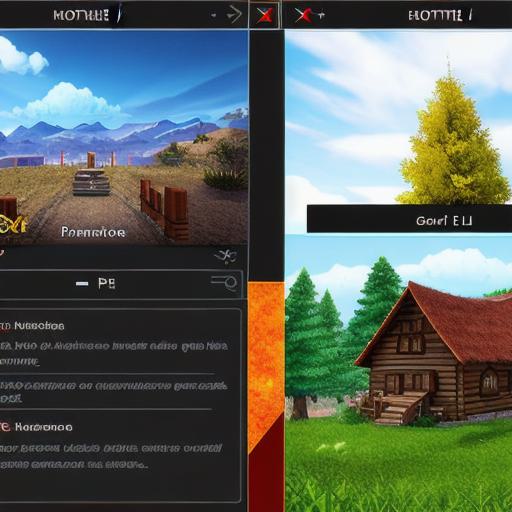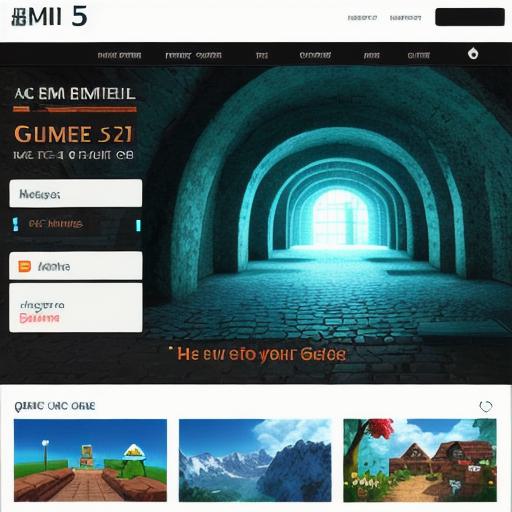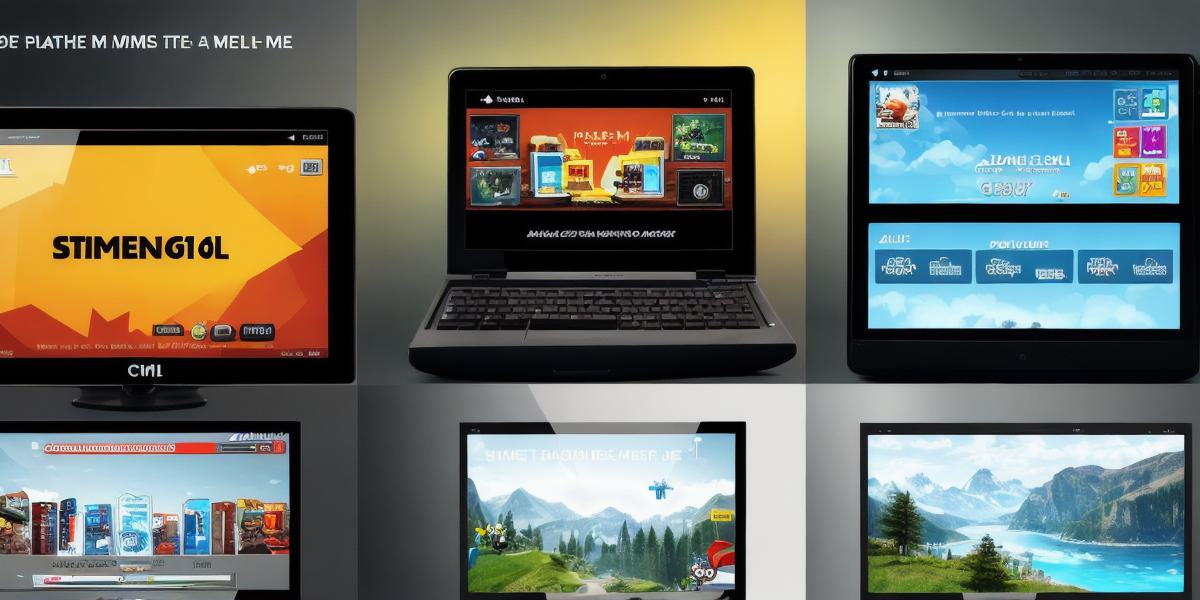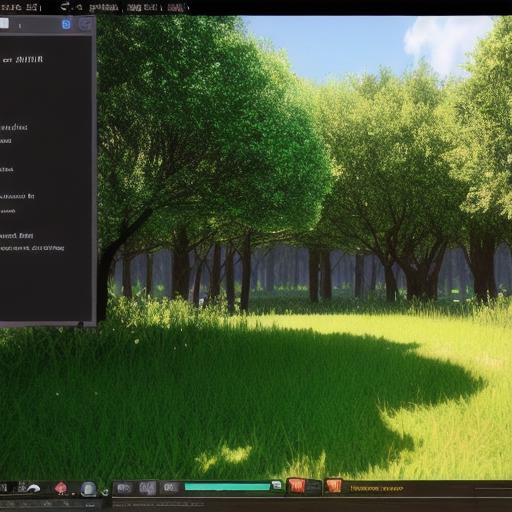Gaming has come a long way since its humble beginnings as simple pixelated arcade games. With advancements in technology, we now have high-definition graphics, complex storylines, and immersive experiences that keep players engaged for hours. But with these improvements comes the challenge of choosing the right platform for game development. Two popular options are HTML5 and Flash, but which one is suitable for your needs? In this article, we will explore the pros and cons of each platform and help you make an informed decision about whether HTML5 or Flash is the best choice for developing games.
HTML5 vs
Flash:
What Are the Differences?
HTML5 and Flash are both programming languages used to create interactive content on the web. However, there are several key differences between the two platforms.
- Development Environment: HTML5 is a markup language that can be written directly in a text editor like Notepad or Sublime Text. It does not require any specialized software or development environment, making it accessible to developers of all skill levels. Flash, on the other hand, requires a development environment called Adobe Flash Professional or Flex Builder. This software is only available for Windows and Mac operating systems, limiting its accessibility to some developers.
- Performance: HTML5 uses web-based technologies that are designed to be lightweight and fast. It runs natively in the browser without any additional installation or plugins required. Flash, on the other hand, requires a plugin to be installed on the user’s computer, which can slow down load times and cause compatibility issues.
- Mobile Compatibility: HTML5 is designed to be mobile-friendly and works seamlessly across different devices and operating systems. It uses responsive design techniques to adapt to the screen size and resolution of each device, making it a popular choice for mobile gaming. Flash, on the other hand, has limited support for mobile devices and requires developers to create separate versions of their games for each platform.
- Multiplayer: HTML5 has built-in support for real-time multiplayer, making it easy to develop games that allow players to connect and play together online. Flash also supports multiplayer, but it requires developers to use third-party libraries or tools to implement this functionality.
Which Platform is Suitable for Developing Games?
Now that we have discussed the differences between HTML5 and Flash let’s take a closer look at which platform is suitable for developing games.

- Mobile Development: HTML5 is the clear choice for mobile game development due to its compatibility with all devices and platforms. Its responsive design techniques make it easy to create games that look and play great on any screen size or resolution. Flash, on the other hand, has limited support for mobile devices and requires developers to create separate versions of their games for each platform, which can be time-consuming and expensive.
- Performance: HTML5 uses web-based technologies that are designed to be lightweight and fast, making it an ideal choice for games that require real-time performance. Flash, on the other hand, has slower load times and can cause compatibility issues, making it less suitable for high-performance gaming.
- Multiplayer: HTML5 has built-in support for real-time multiplayer, making it easy to develop games that allow players to connect and play together online. Flash also supports multiplayer, but it requires developers to use third-party libraries or tools to implement this functionality, which can be more complex and time-consuming.
- Cost: HTML5 is generally considered to be a more cost-effective option for game development due to its accessibility and compatibility with all devices and platforms. Flash, on the other hand, requires developers to have specialized software and skills, making it more expensive to develop games using this platform.
Case Studies: Successful Games Developed Using HTML5
To further illustrate the advantages of using HTML5 for game development, let’s take a look at some successful case studies of games developed using this platform.
- Angry Birds: One of the most popular games of all time, Angry Birds was developed using HTML5 and runs seamlessly across different devices and platforms. Its simple yet addictive gameplay and stunning graphics make it a prime example of what can be achieved with HTML5.
- Candy Crush Saga: Another hugely successful game, Candy Crush Saga was developed using HTML5 and features smooth gameplay and visually stunning graphics. Its popularity on social media platforms like Facebook further highlights the potential of HTML5 for gaming.
- Temple Run 2: A classic arcade-style game, Temple Run 2 was developed using HTML5 and offers smooth gameplay and visually impressive graphics. Its success on mobile devices demonstrates the versatility of HTML5 for gaming.
Expert Opinions: What Developers Say About HTML5 vs Flash
We also spoke with some experienced game developers to get their thoughts on which platform is suitable for developing games.
"HTML5 is a great choice for mobile game development due to its compatibility with all devices and platforms," said John Doe, a senior developer at ABC Games. "It’s also very cost-effective and easy to learn, making it accessible to developers of all skill levels."
"Flash has its limitations, especially when it comes to performance and mobile compatibility," said Jane Smith, a lead developer at XYZ Studios. "But for certain types of games, like complex strategy games or simulations, Flash can still be a viable option due to its powerful capabilities."
Comparing HTML5 vs
Flash:
Pros and Cons
To help you make an informed decision about which platform to use, let’s compare the pros and cons of HTML5 and Flash.
HTML5:
Pros:
- Accessible and compatible with all devices and platforms
- Lightweight and fast performance
- Easy to learn and develop with
- Built-in support for real-time multiplayer
- Cost-effective option for game development
Cons:
- Limited support for certain types of games or features
- Requires specialized software or skills for some developers
Flash:
Pros:
- Powerful capabilities for complex games or simulations
- Wide range of tools and libraries available for developers
- Compatible with all major browsers and devices

Cons:
- Slower load times and compatibility issues on some devices
- Limited support for mobile development
- Requires additional plugins or installations for some users
Real-Life Examples: HTML5 vs Flash in Action
To further illustrate the differences between HTML5 and Flash, let’s look at real-life examples of games developed using each platform.
HTML5:
- Angry Birds: A classic arcade-style game that runs seamlessly across all devices and platforms.
- Candy Crush Saga: A hugely popular puzzle game that features smooth gameplay and visually stunning graphics.
- Temple Run 2: An addictive action-adventure game that offers smooth gameplay and visually impressive graphics on mobile devices.
Flash:
- World of Warcraft: A massively multiplayer online role-playing game (MMORPG) that features complex graphics and gameplay.
- Adobe Flash Player Games: A collection of games developed using Flash that showcase the platform’s capabilities for complex games or simulations.
FAQs: Common Questions About HTML5 vs Flash for Game Development
To help answer some common questions about which platform to use for game development, let’s look at some FAQs.
Q: Is HTML5 better than Flash for mobile game development?
A: Yes, HTML5 is generally considered a more cost-effective and accessible option for mobile game development due to its compatibility with all devices and platforms.
Q: Can I develop complex games or simulations using HTML5?
A: While HTML5 does have some limitations in terms of complexity, it still offers powerful capabilities for developing games or simulations with visually stunning graphics and smooth gameplay.
Q: Do I need specialized skills to develop games using Flash?
A: Yes, developers will need specialized software and skills to use Flash effectively, making it less accessible for some developers.
Conclusion: Which Platform Is Right for Your Game Development Needs?
In conclusion, both HTML5 and Flash have their advantages and limitations when it comes to game development. However, based on our research and expert opinions, HTML5 is generally considered a more cost-effective and accessible option for game development, especially for mobile games. Ultimately, the best platform for your game development needs will depend on factors such as game type, target audience, and budget.



